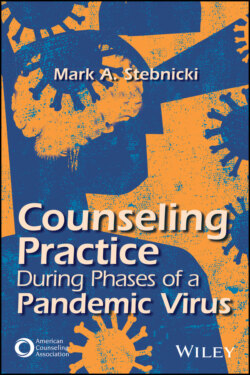Читать книгу Counseling Practice During Phases of a Pandemic Virus - Mark A. Stebnicki - Страница 18
Coping
ОглавлениеCoping strategies and stress appraisal have been studied for decades by classical theorists and stress researchers (e.g., Frankl, 1959; KabatZinn, 1990; R. S. Lazarus, 1999; R. S. Lazarus & Folkman, 1984; Sapolsky, 1998; Selye, 1950). The literature on how individuals cope with a variety of medical, physical, and psychological conditions is quite substantial. Coping, as it relates to persons with chronic illness and disability, is a psychological strategy used to decrease, modify, or diffuse the impact of stressful and critical life events (Livneh & Antonak, 2018). The defining characteristics of coping include how people (a) exhibit and experience coping as a state or trait; (b) control or manipulate their coping strategies; (c) organize their coping style around a range of internal and external characteristics; and (d) respond affectively, cognitively, and/or behaviorally.
Individuals exhibit a range of healthy and unhealthy coping strategies to lessen the impact of extraordinary stressful and traumatic events. Some examples of coping strategies include denial, regression, compensation, rationalization, and diversion. Falvo and Holland (2018) described coping strategies in relation to persons with chronic illness and disability as subconscious mechanisms for dealing and coping with the stress of their medical/physical condition. Thus, the intention of coping is natural. It is a means for people to reduce their levels of stress and anxiety. Coping styles are particularly relevant for individuals dealing with medical, physical, psychological, public health, and environmental impacts of the coronavirus pandemic.
